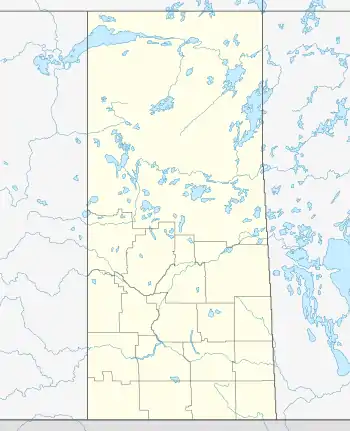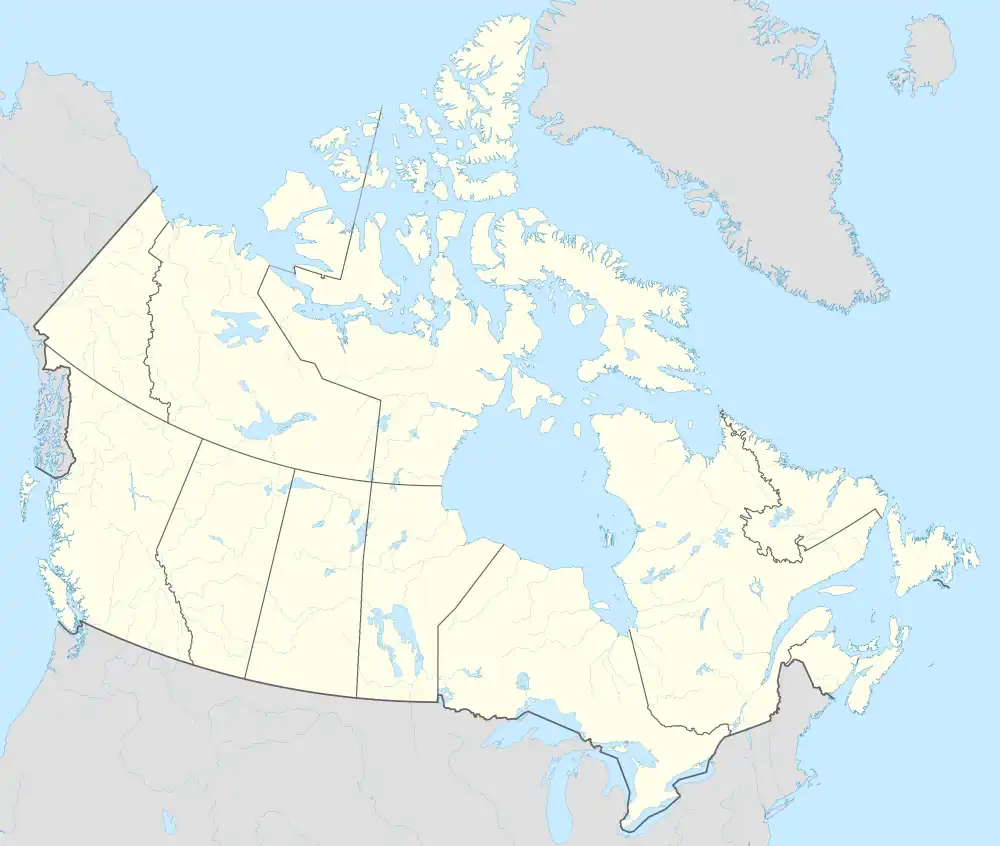Town of Wapella | |
|---|---|
 Town of Wapella  Town of Wapella | |
| Coordinates: 50°15′04″N 101°58′44″W / 50.251083°N 101.978966°W | |
| Country | Canada |
| Province | Saskatchewan |
| Census division | 5 |
| Rural Municipality | Martin |
| Government | |
| • Mayor | Sandy Hintz |
| • Governing body | Wapella Town Council |
| Area | |
| • Total | 838.836 km2 (323.876 sq mi) |
| Elevation | 587 m (1,926 ft) |
| Population (2001) | |
| • Total | 354 |
| Time zone | CST |
| Postal code | S0G 4Z0 |
| Area code | 306 |
| Highways | Highway |
| [1][2][3][4] | |
Wapella (/wəˈpɛlə/) is a town of 354 located northwest of Moosomin on the Trans-Canada Highway.
Demographics
In the 2021 Census of Population conducted by Statistics Canada, Wapella had a population of 278 living in 117 of its 143 total private dwellings, a change of -14.7% from its 2016 population of 326. With a land area of 2.63 km2 (1.02 sq mi), it had a population density of 105.7/km2 (273.8/sq mi) in 2021.[5]
Notable people
- Brett Clark - professional hockey player in NHL. He played in the Canadian National team program, as well as for the Montreal Canadiens, Atlanta Thrashers, Colorado Avalanche, Tampa Bay Lightning and Minnesota Wild franchises.
- Bud Holloway, a professional hockey player. He currently plays (2015/2016 season) for the St. John's IceCaps in the AHL. He has previously played for SC Bern in the National League A, it is the top tier of the Swiss hockey league system, for the Skellefteå AIK in the SHL and for the Manchester Monarchs, the AHL affiliate of the Los Angeles Kings.
- Cyril Edel Leonoff is the grandson of Edel Brotman, a homesteader and rabbi of the Wapella, Saskatchewan, farm colony, 1889–1906.[6]
Climate
| Climate data for Wapella | |||||||||||||
|---|---|---|---|---|---|---|---|---|---|---|---|---|---|
| Month | Jan | Feb | Mar | Apr | May | Jun | Jul | Aug | Sep | Oct | Nov | Dec | Year |
| Record high °C (°F) | 8 (46) |
9 (48) |
21 (70) |
32.5 (90.5) |
36.5 (97.7) |
35.5 (95.9) |
38 (100) |
37.5 (99.5) |
33.5 (92.3) |
29.5 (85.1) |
22.5 (72.5) |
12 (54) |
38 (100) |
| Mean daily maximum °C (°F) | −10.5 (13.1) |
−6.7 (19.9) |
−0.3 (31.5) |
10 (50) |
17.8 (64.0) |
21.8 (71.2) |
24.4 (75.9) |
24 (75) |
17.6 (63.7) |
10 (50) |
−1.3 (29.7) |
−8.6 (16.5) |
8.2 (46.8) |
| Daily mean °C (°F) | −15.8 (3.6) |
−11.4 (11.5) |
−5.2 (22.6) |
3.9 (39.0) |
11 (52) |
15.5 (59.9) |
18.1 (64.6) |
17.3 (63.1) |
11.4 (52.5) |
4.6 (40.3) |
−5.5 (22.1) |
−13.4 (7.9) |
2.5 (36.5) |
| Mean daily minimum °C (°F) | −21 (−6) |
−16.2 (2.8) |
−10.2 (13.6) |
−2.2 (28.0) |
4.2 (39.6) |
9.2 (48.6) |
11.6 (52.9) |
10.6 (51.1) |
5 (41) |
−0.9 (30.4) |
−9.7 (14.5) |
−18.1 (−0.6) |
−3.1 (26.4) |
| Record low °C (°F) | −42 (−44) |
−41 (−42) |
−35.5 (−31.9) |
−23.5 (−10.3) |
−11.5 (11.3) |
−2 (28) |
2 (36) |
−3.5 (25.7) |
−7.5 (18.5) |
−21 (−6) |
−36.5 (−33.7) |
−42 (−44) |
−42 (−44) |
| Average precipitation mm (inches) | 19.8 (0.78) |
16.9 (0.67) |
21.8 (0.86) |
21.1 (0.83) |
49.5 (1.95) |
70.5 (2.78) |
69.7 (2.74) |
66 (2.6) |
47.9 (1.89) |
27.8 (1.09) |
18.5 (0.73) |
16.4 (0.65) |
445.7 (17.55) |
| Source: Environment Canada[7] | |||||||||||||
See also
Footnotes
- ↑ National Archives, Archivia Net, Post Offices and Postmasters
- ↑ Government of Saskatchewan, MRD Home, Municipal Directory System, archived from the original on November 21, 2008
- ↑ Canadian Textiles Institute. (2005), CTI Determine your provincial constituency
- ↑ Commissioner of Canada Elections, Chief Electoral Officer of Canada (2005), Elections Canada On-line
- ↑ "Population and dwelling counts: Canada, provinces and territories, census divisions and census subdivisions (municipalities), Saskatchewan". Statistics Canada. February 9, 2022. Retrieved April 1, 2022.
- ↑ Cyril E. Leonoff fonds , Jewish Historical Society of British Columbia
- ↑ Environment Canada - Canadian Climate Normals 1971-2000—Canadian Climate Normals 1971–2000, accessed 23 December 2010
This article is issued from Wikipedia. The text is licensed under Creative Commons - Attribution - Sharealike. Additional terms may apply for the media files.
